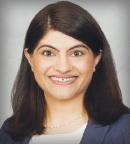The session’s invited discussant Surbhi Sidana, MD, Assistant Professor of Medicine, Stanford University, said chimeric antigen receptor (CAR) T-cell therapy and bispecific antibodies targeting myeloma are emerging as potentially effective options for patients with highly refractory disease. For this population of triple-class–refractory patients, historical response rates across a range of agents have typically hovered around 30%, with median progression-free survival of 3 to 4 months and median overall survival limited to about 1 year.

Surbhi Sidana, MD
CAR T-cell therapies that target B-cell maturation antigen (BCMA) have notably improved upon these outcomes. With idecabtagene vicleucel, in KarMMa, response rates reached 70%, and complete response rates have exceeded 30%.1 With ciltacabtagene autoleucel, an “unprecedented” response rate of 98% was observed, and two-thirds of patients remained progression-free at 18 months, in an update of CARTITUDE-1 presented during the 2021 ASCO Annual Meeting.2
“The bar in triple-class–refractory myeloma has now been set high,” Dr. Sidana said. “BCMA-directed bispecific antibodies are another way to harness CAR T cells to target myeloma.”
With the BCMA-targeting bispecific antibodies teclistamab3 and elranatamab,4 about two-thirds of heavily pretreated patients, mostly with triple-class–refractory disease, responded, “which is a very high response rate” in this population, she said. Other BCMA-directed bispecific antibodies are in clinical development, including AMG-701, TNB-383B, REGN-5458, and CC-93269. Most are given weekly and produce responses in more than 60% of patients with highly refractory disease.
New Unmet Need: Treatment After Relapse
With efficacy shown for BCMA-targeted therapies, a new unmet need is treating patients who relapse after these treatments. “Patients are having quad-class–refractory and hexa-refractory myeloma,” Dr. Sidana observed.
The mechanism of these relapses may include antigen escape, lack of CAR T-cell persistence, and exhaustion of CAR T cells or endogenous T cells. As a result, a new focus should be on developing non-BCMA targets for both CAR T-cell and bispecific therapies (especially in patients with loss or downregulation of BCMA). To this end, several such targets are in development: GPRC5D, FcRH5, SLAMF7, CD38, and CD138.
Data for talquetamab,5 which targets GPRC5D, were presented by Jesus G. Berdeja, MD, mostly in patients with triple-class–refractory disease, 20% of whom had received prior BMCA-targeted therapy. More than two-thirds of patients responded, including those with prior BCMA-targeted treatment. Similar outcomes have been found with another GPRC5D-targeting bispecific antibody, cevostamab.
Choosing Among Effective Therapies
“With great responses seen with bispecific antibodies and CAR T-cell therapy, the big questions remain: Which is better, and which should you choose for your patients? Each approach has its advantages and limitations,” Dr. Sidana said.
“High response rates are seen with both CAR T-cell therapy and bispecific antibodies, but they are overall higher with CAR T-cell therapy. With CAR T cells, they also appear to be durable, although it is too early to say for bispecific antibodies. It is possible that bispecific antibodies may be more suitable, however, in less fit patients, although clinical trials usually exclude such patients. Also, it’s challenging to use CAR T-cell therapy in patients with renal dysfunction, and bispecific antibodies should be investigated in these patients as well,” Dr. Sidana continued. She also suggested enrolling patients with central nervous system involvement and plasma cell leukemia in these trials, as these patients have an unmet need and are often excluded from clinical trials.
Finally, Dr. Sidana said that toxicities associated with the bispecific antibodies are no longer unusual or unexpected and are generally manageable. However, she added, “as we integrate these therapies into our clinical practice, we need to focus on evaluating and addressing quality of life and other late side effects with these new treatments.”
DISCLOSURE: Dr. Sidana has served as a consultant or advisor to Janssen; and has received institutional research funding from Allogene Therapeutics, Janssen, and Magenta Therapeutics.
REFERENCES
1. Munshi NC, Anderson Jr LD, Shah N, et al: Idecabtagene vicleucel in relapsed and refractory multiple myeloma. N Engl J Med 384:705-716, 2021.
2. Usmani SZ, Berdeja JG, Madduri D, et al: Ciltacabtagene autoleucel, a B-cell maturation antigen-directed chimeric antigen receptor T-cell therapy, in relapsed/refractory multiple myeloma: Updated results from CARTITUDE-1. 2021 ASCO Annual Meeting. Abstract 8005. Presented June 8, 2021.
3. Krishnan AY, Garfall AL, Mateos MV, et al: Updated phase 1 results of teclistamab, a B-cell maturation antigen × CD3 bispecific antibody, in relapsed/refractory multiple myeloma. 2021 ASCO Annual Meeting. Abstract 8007. Presented June 8, 2021.
4. Bahlis NJ, Raje NS, Costello C, et al: Efficacy and safety of elranatamab (PF-06863135), a B-cell maturation antigen-CD3 bispecific antibody, in patients with relapsed or refractory multiple myeloma. 2021 ASCO Annual Meeting. Abstract 8006. Presented June 8, 2021.
5. Berdeja JG, Krishnan AY, Oriol A, et al: Updated results of a phase 1, first-in-human study of talquetamab, a G protein-coupled receptor family C group 5 member D x CD3 bispecific antibody, in relapsed/refractory multiple myeloma. 2021 ASCO Annual Meeting. Abstract 8008. Presented June 8, 2021.

